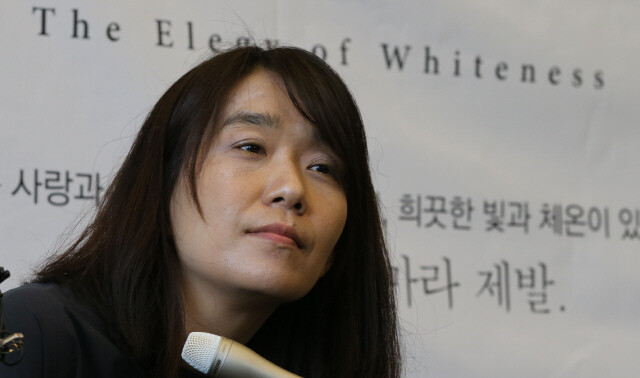Han Kang’s 2024 Nobel Prize win in Literature has been met with pride and celebration in Korea, as many hail it as a significant achievement for the nation’s cultural landscape. However, to stop at mere celebration would be to overlook the deeper, often uncomfortable societal critiques embedded in her work. Her literature doesn’t shy away from exploring the dark undercurrents of Korean society—violence, oppression, trauma, and the personal and collective cost of such experiences. Let’s dive into her most notable works and unpack the hard-hitting messages that not everyone is ready to celebrate.
The Vegetarian (2007): A Defiant Rejection of Control

The Vegetarian tells the story of Yeong-hye, a woman who suddenly rejects meat, triggering a series of violent and oppressive reactions from her family and society. Her decision is more than a personal dietary choice; it’s an act of rebellion against the patriarchal control over her body and identity. As Yeong-hye descends further into isolation and madness, the novel exposes the suffocating expectations placed on women and the often violent consequences of non-conformity in a rigid society.
Through Yeong-hye’s story, Han Kang critiques the ways in which societal norms can strip away personal autonomy, particularly for women. The Vegetarian becomes a powerful commentary on how society punishes those who deviate from the norm, especially in terms of gender roles and body autonomy. The discomfort some readers feel toward Yeong-hye's actions is the very point—Han forces readers to confront how quickly we judge and suppress what we don’t understand.
Human Acts (2014): State Violence and Unhealed Wounds
Human Acts focuses on the 1980 Gwangju Uprising, a pro-democracy movement brutally suppressed by the military. The novel revolves around Dong-ho, a young boy who becomes one of the many victims of the state’s violence. After his death, those who knew him carry the trauma, each struggling with their grief and haunted by the brutality they witnessed.
Han Kang doesn’t just document the historical events; she digs into the lasting scars left on individuals and society. Human Acts asks readers to remember the cost of democracy and the human toll of state violence. It’s a stark reminder that some wounds, especially those inflicted by the state, don’t heal easily, if at all. The novel remains deeply relevant in a world where state violence and civil unrest continue to leave their mark on societies worldwide.
The White Book (2016): Mourning Through the Color of Emptiness

The White Book is a meditation on life, death, and loss, all symbolized through the color white. The narrator imagines the life of her older sister, who died shortly after birth, and reflects on objects like snow, cloth, and breast milk as symbols of purity, emptiness, and mourning. The novel’s sparse, poetic prose mirrors the delicate nature of life and the lingering presence of death.
Here, Han Kang delves into the universal experience of grief and loss, presenting death not as an end but as part of the ongoing cycle of life and memory. The White Book compels readers to think about how we process personal loss, the ways in which we carry the dead with us, and how grief can lead to rebirth and transformation. The novel is as much about what is left unsaid as what is expressed—an invitation to reflect on the emotional spaces we often leave untouched.
Greek Lessons (2011): Language as a Tool for Healing

Greek Lessons follows a protagonist who, after losing a loved one, begins learning Greek as a way to process her grief and find meaning in her life again. Through learning a new language, she embarks on a journey of self-discovery, confronting her pain and reshaping her understanding of existence.
This novel is an exploration of how language can both reveal and heal the soul. Han Kang uses the protagonist’s linguistic journey to illustrate how we use language to make sense of the world, especially in the wake of loss. Greek Lessons suggests that by engaging with something unfamiliar, we can begin to understand ourselves better, particularly when dealing with emotional trauma. It’s a powerful reminder that even in our most isolated moments, there’s a path toward healing, if we’re willing to seek it.
The Societal Critique and Conservative Backlash

While many have celebrated Han Kang’s Nobel Prize win, it’s worth noting that not everyone is comfortable with the themes her work explores. Feminism, state violence, and the questioning of traditional values are central to much of her literature, and these themes have provoked discomfort in more conservative circles. Some critics argue that her focus on gender issues and historical traumas like the Gwangju Uprising paints too bleak a picture of Korea, while others feel her work challenges conventional ideas of nationhood and cultural pride.
Rather than simply basking in the glory of a Korean author winning a Nobel Prize, perhaps now is the time for deeper reflection on the critiques Han Kang has consistently raised. Her works are not just stories of personal trauma and isolation; they are sharp examinations of the structural issues in Korean society—issues that remain unresolved.
Beyond the Applause: What Does Han Kang's Literature Force Us to Confront?
Han Kang’s Nobel win is not just a moment of national pride—it’s an opportunity for self-examination. Her literature pushes us to look critically at the very fabric of society, to confront the violence and oppression that continue to shape the lives of individuals. Celebrating Han Kang means more than just applauding her achievements; it means engaging with the uncomfortable truths she reveals.
